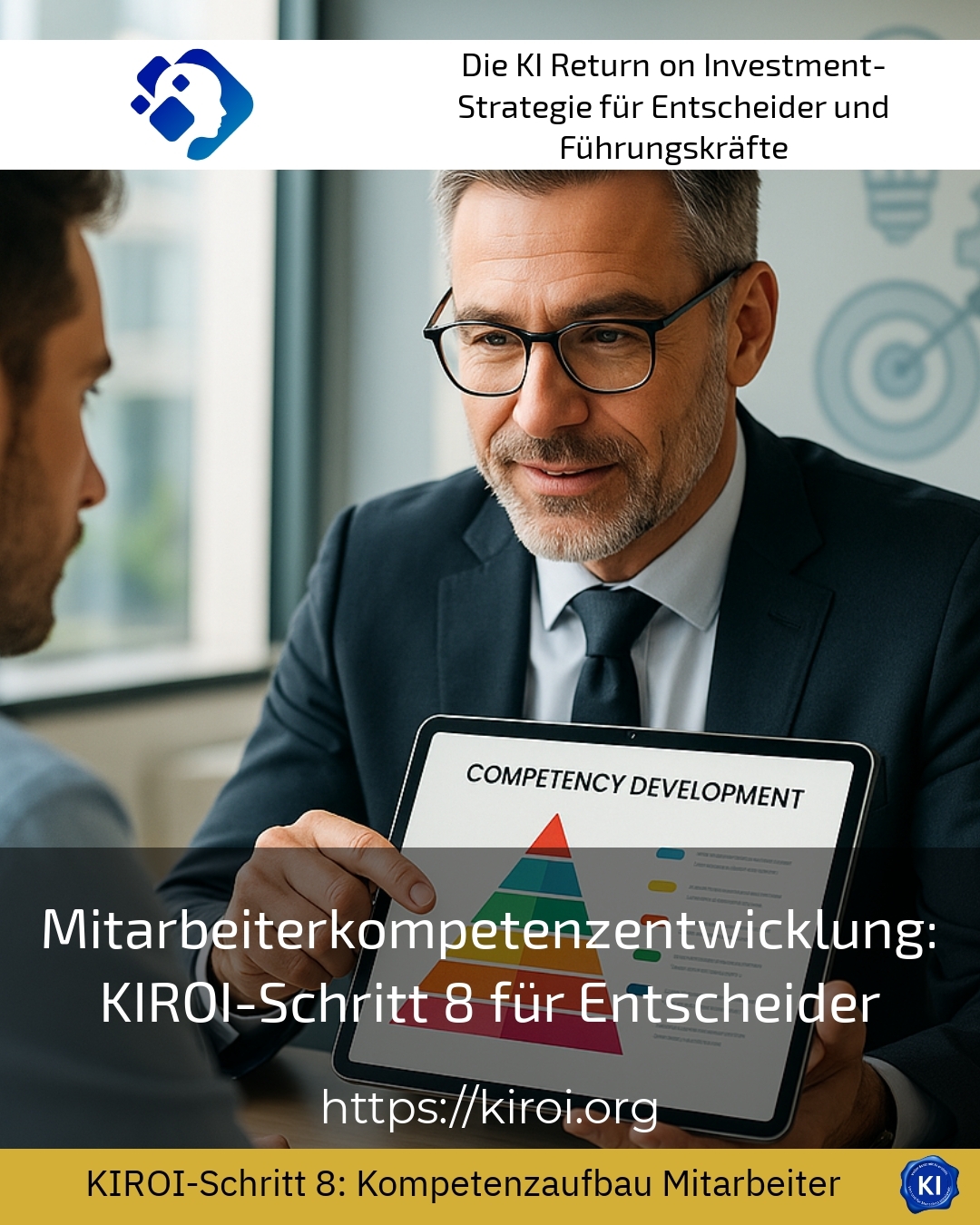Employee skills development is a key success factor for companies. It supports the targeted promotion of skills and knowledge that organisations need to remain competitive in a dynamic market environment. KIROI Step 8 provides important impetus for decision-makers to organise this process effectively. In this way, both individual potential and strategic corporate goals can be optimally combined.
Focus on employee skills development: KIROI step 8 as the decisive stage
In the eighth step of the KIROI model, employee skills development is supported in a targeted and technology-based manner. Artificial intelligence makes it possible to adapt learning content individually and offer personalised development programmes. This enables employees to develop precisely the skills they need in the company now and in the future.
In the manufacturing industry, for example, companies use AI-supported systems to automatically recognise training needs and initiate tailor-made training courses. This avoids under- or over-training and at the same time increases employee motivation.
There are also valuable practical examples in the IT sector: Employees automatically receive suggestions on programming languages and frameworks that they should learn for new projects - based on the analyses of the AI systems. This provides precise guidance and support for skills development.
In the financial services sector, such AI solutions often lead to improved transparency in career paths and development options, which has a positive impact on employee retention.
Practical implementation of employee skills development in the company
Effective employee skills development takes place at various levels. Three central areas stand out:
1. practical level: learning by doing
Through job rotation or project work, employees acquire new skills directly in the workplace. In mechanical engineering, for example, specialists move between departments in order to familiarise themselves with different technologies and understand practical requirements.
In retail, employees are often deployed in changing sales formats in order to deepen their customer orientation and strengthen their communication skills.
On-the-job training is also effective in the service industry to learn how to deal with changing customer enquiries and situations.
2nd coaching level: Individual support and promotion
Mentoring programmes or individual coaching sessions help to develop personal strengths. At the pharmaceutical company, an experienced mentor supports young employees in the development of project-related expertise and soft skills.
In the technology sector, specialists receive coaching to help them overcome complex problems and develop their leadership skills.
Coaching also offers social organisations the opportunity to tackle challenging situations in a reflective manner and improve skills in dealing with clients.
3rd training level: Deepening theoretical knowledge
Workshops and seminars are offered for structured skills development. In the area of marketing, for example, such formats provide training in the use of new digital advertising platforms.
In the healthcare sector, training focuses on communicating medical innovations and new treatment methods.
Banks also regularly offer compliance seminars, which are important for meeting legal requirements.
Best practices for employee skills development with KIROI
BEST PRACTICE with one customer (name hidden due to NDA contract) In a medium-sized IT company, AI-based learning paths were used to specifically promote employee skills development. Employees received personalised training recommendations based on their current projects and individual skills. This led to a measurable increase in project quality and greater satisfaction within the team.
BEST PRACTICE with one customer (name hidden due to NDA contract) A manufacturing company has implemented AI-supported systems to automatically recognise training needs and offer suitable training courses on time. This enabled the qualification of employees in key areas to be flexibly adapted to market requirements.
BEST PRACTICE with one customer (name hidden due to NDA contract) In the financial sector, one company supported its specialists with AI-supported career planning. Employees were given transparent insights into development opportunities, which strengthened their loyalty to the company in the long term.
Recommendations for decision-makers
Decision-makers should consider employee skills development as an integral part of the corporate strategy. Regularly analysing actual and target skills is essential. AI-supported tools can help to identify development needs at an early stage and plan customised measures.
It is also advisable to combine various forms of development such as on-the-job training, coaching and structured training programmes. In this way, professional, methodological and social skills are comprehensively promoted.
In addition, the use of intelligent technologies that customise learning content is recommended. This increases employee motivation and ensures efficient training.
My analysis
Employee skills development remains a dynamic process that must constantly respond to new challenges. KIROI Step 8 shows how technical innovations can help to personalise and optimise this process. Decision-makers are well advised to see employee skills development as a strategic task and to support it with targeted measures and modern technology.
Individual development opportunities can be maximised through the conscious use of a variety of methods and the use of modern tools. This not only ensures competitiveness, but also increases employee satisfaction.
Further links from the text above:
Skills development: definition + successful examples
Employee skills development: KIROI step 8 for decision-makers
Successful skills development: 9 tips and 3 methods
Sanjay Sauldie: Expert in employee competence development
KIROI step 8: Strengthen employee development in a targeted manner with AI
For more information and if you have any questions, please contact Contact us or read more blog posts on the topic Artificial intelligence here.















